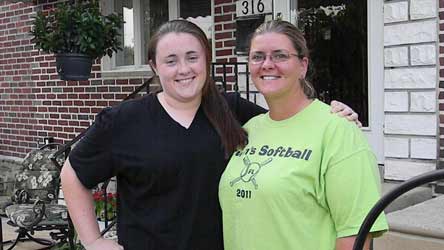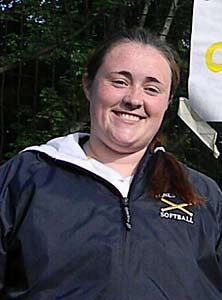
Katie McCollum, left, and Agnes Irwin softball coach Lisa D'Orazio have a mutual admiration for each other.
Photo by Joseph Santoliquito
The silence was always easy to accept. Welcoming, soothing — save for a click of the remote and whatever happened to be on TV that night.
It became almost a ritual for
Katie McCollum, curled up on her apartment floor each night. That's where she liked to sit. Just she and her TV. Nothing else.
It's where she was when the phone call came Oct. 13, 2009. The news gripped her for a second, each word spilling out of the phone, carrying more and more impact.
You have to know
Katie McCollum to understand her. Very little affects her.
This did.
The three-year starting catcher for
Agnes Irwin (Rosemont, Pa.), an exclusive private school off the Main Line in Radnor, Pa., had to call her softball coach, Lisa D'Orazio, and forward the news. She had to tell D'Orazio her life would be hers exclusively, that she was granted a rare option very few teenagers have, especially high school varsity players.

Katie McCollum will play atWest Chester next season.
Photo by Joseph Santoliquito
McCollum would be granted emancipation, a legal process that gives a teenager who is 16 or older legal independence from his or her guardians or parents. In truth, McCollum has been an adult since she was 8, taking care of her ailing parents, doing everything from cooking dinner to finding inventive ways to reach up and grab the washing machine knob when doing laundry.
In early May, Katie became the first recipient of the Kelly Rooney Memorial Scholarship Award, which is a $10,000 grant given to a high school senior athlete who lost a mother to cancer. It is named after Kelly Rooney, a member of the Pittsburgh Steelers' Rooney family who died of breast cancer at the age of 43 in 2006.
Katie's mother Kathleen died from a rare form of cancer when Katie was 8, and her father Daniel died in July 2009 from a heart ailment. He older brother Joseph was away in college, and living with her paternal grandmother wasn't exactly cutting it. Katie was used to living on her own and being self-sufficient.
"My father was sick and my brother was taking classes, and the summer between my sophomore and junior years, I was already living alone; I just got into a routine," Katie said. "I couldn't drive then and I got used to getting on a bus to see my father in the hospital. But I was by myself. I kept it quiet. I just never really tell people my business. I like keeping to myself. My father was sick before, when I was in sixth grade, and I was used to it living alone. I took care of my father since I was 12. It seemed normal to me. I still went out and did everything kids do that age.
"I could tell there was a difference between the way I grew up and the way other kids my age grew up. But I don't think I missed out on anything. I started cooking when I was 8, and I remember doing the laundry. I had to use a ladder because the washer was too high for me to reach over with the knobs. I thought it was fun."
But something didn't sit right with D'Orazio. She could sense something wasn't exactly right with her star catcher.
Agnes Irwin is a high-academic school, filled with challenging curriculum. After her father died in the summer of 2009, McCollum was getting back and forth to school on her own, juggling a heavy load of academics, coupled with balancing a checkbook, paying the bills of the apartment and doing things on her own.
Everyone around her assumed she was living with her grandmother. But the two had totally different schedules and Katie was used to taking care of herself. She'd do her own laundry, cook her own dinner. She didn't like asking anyone for anything.
D'Orazio felt compelled to intercede.
"I had to," said D'Orazio, who has directed the Owls to four straight Inter-Academic League championships. "I assumed Katie was living on her own and I became concerned. I could just tell by some of the things she was saying, something wasn't right. I asked her questions all of the time. I worried about her being alone and not having anyone. I was calling her and texting her because I wanted to make sure she was OK. I remember bringing her dinner for a week. She would never ask for anything."
D'Orazio had offered to help pay some of McCollum's bills. She said no. She offered her home to stay there temporarily. McCollum said no to that, too. D'Orazio even spoke to her husband Jim about converting the basement into a bedroom for Katie, which was also nixed.
Finally, D'Orazio broached the idea of emancipation. She researched it before presenting it to Katie, which would enable her to live on her own.
"My grandmother was trying, but I wanted freedom. I knew I could take care of myself," McCollum said. "My parents' social security survival benefits help pay the bills, the electric, water, cable, cell phone and rent. My grandmother was a little reluctant to sign off on it, though. I looked it up online and not many people got it who actually applied for it. I had to show proof of income and a place to live, and show I was capable of living alone. I didn't think it was hard to apply for it, but I didn't think I would get it, either. I wanted to live on my own."
She's been on her own ever since.
McCollum is headed to West Chester University, where she intends to continue her softball career. She has a unique outlook that goes beyond most teenagers, so when little dramas flare up, she laughs to herself. She and her brother Joe will share an apartment this summer together in the Philadelphia suburbs, before Katie is off again to college. For most of the incoming freshmen, independence will be a new world of starts and stops and constant learning.
For Katie, it won't be anything she hasn't experienced before.
"Katie is a special, special person," D'Orazio said. "Every day I thank my lucky stars she was at Agnes Irwin and I'm grateful she's been a part of my life. I can't image my life without her. I'll remember her for her leadership on the field, and when we did team things, Katie always made sure everyone was included. She's selfless, and nurturing. There is a caring side to her that no other 16, 17, 18-year old has. I don't think I could have done what she's done. It's as if she's been an adult her whole life. I know she's grateful she has softball to remind her she's still a kid who can have fun."
